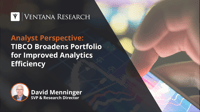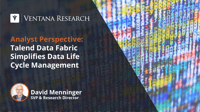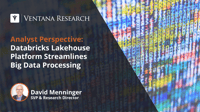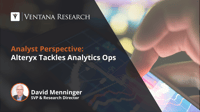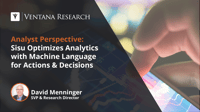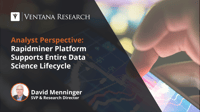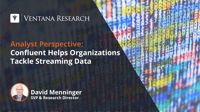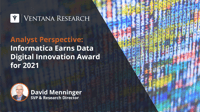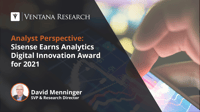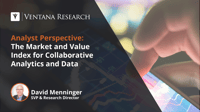TIBCO is a large, independent cloud-computing and data analytics software company that offers integration, analytics, business intelligence and events processing software. It enables organizations to analyze streaming data in real time and provides the capability to automate analytics processes. It offers more than 200 connectors, more than 200 enterprise cloud computing and application adapters, and more than 30 non-relational structured query language databases, relational database management...
Read More
Topics:
embedded analytics,
Analytics,
Collaboration,
Data Governance,
Information Management,
Data,
Digital Technology,
data lakes,
AI & Machine Learning
Talend is a data integration and management software company that offers applications for cloud computing, big data integration, application integration, data quality and master data management. The platform enables personnel to work with relational databases, Apache Hadoop, Spark and NoSQL databases for cloud or on-premises jobs. Talend data integration software offers an open and scalable architecture and can be integrated with multiple data warehouses, systems and applications to provide a...
Read More
Topics:
Analytics,
Business Intelligence,
Collaboration,
Data Governance,
Data Preparation,
Information Management,
Data,
Digital Technology,
data lakes,
AI & Machine Learning
Databricks is a data engineering and analytics cloud platform built on top of Apache Spark that processes and transforms huge volumes of data and offers data exploration capabilities through machine learning models. It can enable data engineers, data scientists, analysts and other workers to process big data and unify analytics through a single interface. The platform supports streaming data, SQL queries, graph processing and machine learning. It also offers a collaborative user interface —...
Read More
Topics:
embedded analytics,
Analytics,
Business Intelligence,
Collaboration,
Data Governance,
Data Preparation,
Information Management,
Data,
data lakes,
AI & Machine Learning
Alteryx is a data analytics software company that offers data preparation and analytics tools to simplify and automate data wrangling, data cleaning and modeling processes, enabling line-of-business personnel to quickly access, manipulate, analyze and output data. The platform features tools to run a variety of analytic functions such as diagnostic, predictive, prescriptive and geospatial analytics in a unified platform, and can connect to various data warehouses, cloud applications,...
Read More
Topics:
embedded analytics,
Analytics,
Business Intelligence,
Collaboration,
Data Preparation,
Data,
AI & Machine Learning
Sisu Data is an analytics platform for structured data that uses machine learning and statistical analysis to automatically monitor changes in data sets and surface explanations. It can prioritize facts based on their impact and provide a detailed, interpretable context to refine and support conclusions. The product features fact boards, annotations and the ability to share facts and analysis across teams. Data teams and analysts start by creating common definitions of key performance...
Read More
Topics:
embedded analytics,
Analytics,
Business Intelligence,
Collaboration,
Data,
AI & Machine Learning
Rapidminer is a visual enterprise data science platform that includes data extraction, data mining, deep learning, artificial intelligence and machine learning (AI/ML) and predictive analytics. It can support AI/ML processes with data preparation, model validation, results visualization and model optimization. Rapidminer Studio is its visual workflow designer for the creation of predictive models. It offers more than 1,500 algorithms and functions in their library, along with templates, for...
Read More
Topics:
embedded analytics,
Analytics,
Business Intelligence,
Collaboration,
Data Preparation,
Data,
data lakes,
AI & Machine Learning
Confluent Platform is a streaming platform built by the original creators of Apache Kafka. It enables organizations to organize and manage streaming data from various sources. Confluent launched its IPO in June this year and raised $828 million to further expand its business. Confluent Platform was brought to several public cloud vendor marketplaces last year as Confluent Cloud. The offering is currently available in Azure, AWS, and GCP marketplaces. Furthermore, the company strengthened its...
Read More
Topics:
embedded analytics,
Analytics,
Business Intelligence,
Collaboration,
Data,
AI & Machine Learning
The annual Ventana Research Digital Innovation Awards showcase advances in the productivity and potential of business applications, as well as technology that contributes significantly to the improved processes and performance of an organization. Our goal is to recognize technology and vendors that have introduced noteworthy digital innovations to advance business and IT.
Read More
Topics:
Analytics,
Business Intelligence,
Collaboration,
Data Governance,
Information Management,
Data,
Digital Technology,
blockchain,
data lakes,
AI & Machine Learning
The annual Ventana Research Digital Innovation Awards showcase advances in the productivity and potential of business applications, as well as technology that contributes significantly to the improved processes and performance of an organization. Our goal is to recognize technology and vendors that have introduced noteworthy digital innovations to advance business and IT.
Read More
Topics:
embedded analytics,
Analytics,
Business Intelligence,
Collaboration,
Internet of Things,
Digital Technology,
natural language processing,
AI & Machine Learning
I am happy to share insights gleaned from our latest Value Index research, an assessment of how well vendors’ offerings meet buyers’ requirements. The 2021 Ventana Research Value Index: Collaborative Analytics and Data is the distillation of a year of market and product research by Ventana Research. See our prior post for a description of our methodology and included vendors.
Read More
Topics:
business intelligence,
Analytics,
Collaboration,
Data Preparation,
Information Management,
Data,
Digital Technology,
natural language processing,
mobile computing
